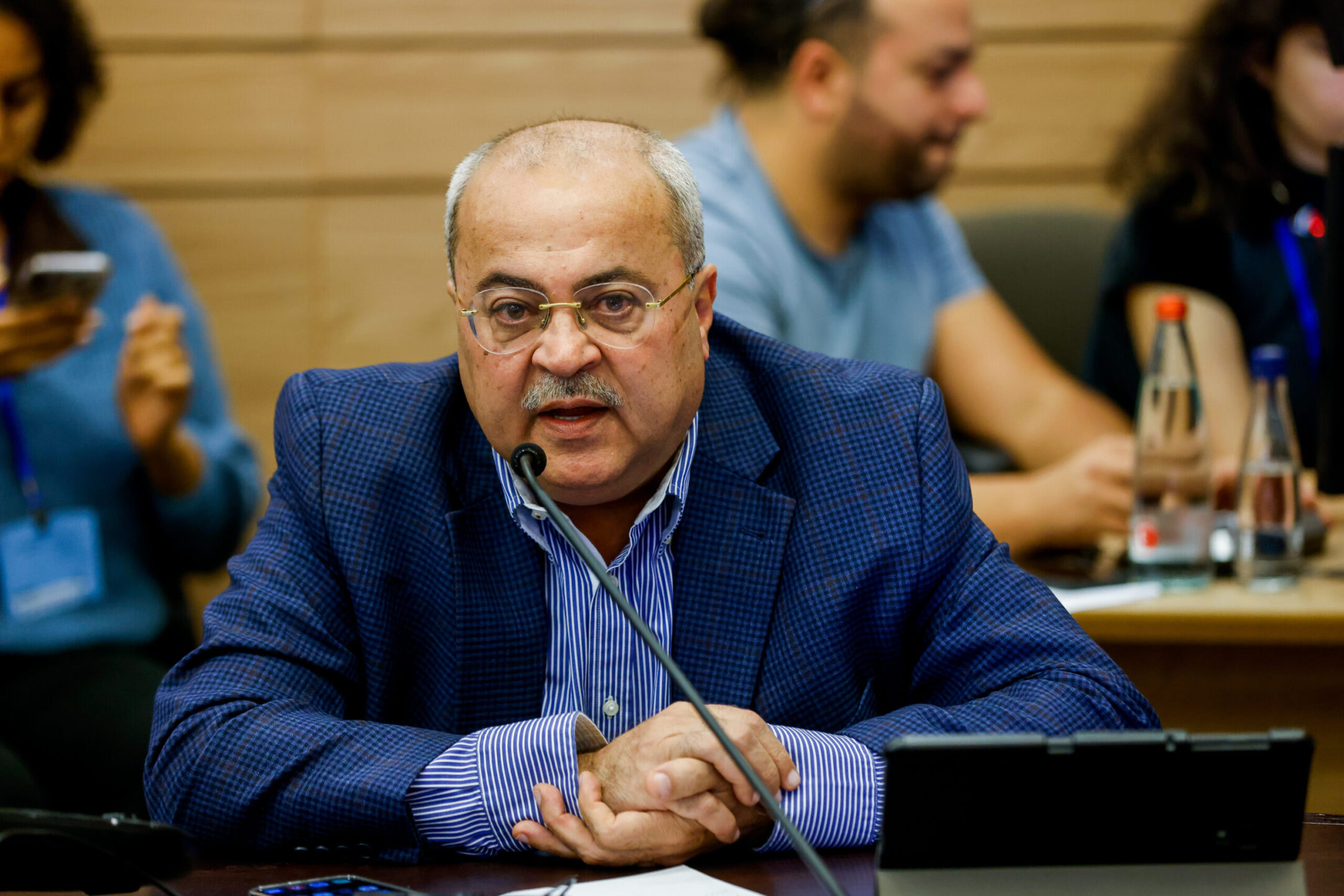(JTA) — An American Jewish group that has provided aid to Jewish communities in crisis for more than a century has become the target of one of Israel’s newly empowered far-right ministers.
Itamar Ben-Gvir, who serves as national security minister, said on Wednesday that he was shutting down a program dedicated to reducing violence in Arab Israeli towns. His reason: The program is operated by the American Jewish Joint Distribution Committee, which he called a “leftist organization.”
“JDC is a nonpolitical organization and has been so since our founding in 1914,” Michael Geller, a spokesperson for JDC, told the Jewish Telegraphic Agency.
Ben-Gvir’s characterization baffled many across the Jewish communal world who know the JDC as a nonpartisan group with an extensive track record of providing humanitarian aid to Jews in distress.
To them, Ben-Gvir’s criticism of the group is the latest sign that the rupture of political norms in Israel extends beyond the judicial reforms advanced by the government, which have drawn unprecedented protests.
“To call the JDC a left-wing organization is a joke. It is not political in any way,” said Amnon Be’eri-Sulitzeanu, co-CEO of the Abraham Initiatives, a nonprofit that works toward an “equal and shared society” for Jewish and Arab Israelis.
Be’eri-Sulitzeanu, who is Jewish, said he anticipated changes by the right-wing government, which was inaugurated in December. But he was surprised by Ben-Gvir’s announcement.
“I could expect revisiting collaboration with organizations that are branded as civil rights or human rights or Israeli-Palestinian organizations,” he added. “But the JDC — it’s very strange.”
Founded in 1914 by the American Jewish banker Jacob Schiff to aid Jews living in Palestine, the “Joint” has distributed billions of dollars in assistance across 70 countries — including, over the last year, to 43,000 Ukrainian Jews amid the war there. It played a central role in aiding Holocaust survivors following World War II, as well as in the resettlement of Jews from the former Soviet Union.
Among its biggest sources of support are Jewish federations, the nonpartisan umbrella charities found in nearly every major North American Jewish community.
“JDC is an apolitical organization that has worked with every government since the establishment of the State of Israel, providing critical services to the elderly, youth-at-risk, people with disabilities and other underserved populations across all sectors, including Haredim and Arab-Israelis,” the Jewish Federations of North America said in a statement. “JDC’s activities are a living and breathing example of the Jewish values of tikkun olam and tzedakah that guide Jewish Federations’ work every day,” Hebrew phrases that connote the Jewish imperative to repair the world, as well as charity.

JDC staff packing matzahs and haggadahs for online seders in Odessa, Ukraine, April 7, 2022. (JDC)
In Israel, the group funds and operates efforts to help needy populations — including immigrants, the elderly, people with disabilities and people living in poverty. Those efforts often involve working with the government, which in 2007 gave the JDC Israel’s most prestigious prize for its work. This year, according to a spokesman, the group is spending $129 million on Israel initiatives.
The JDC’s government-funded programs include the anti-violence effort that Ben-Gvir is targeting. It was made possible last year due to nearly $1 billion in funding to curb crime in Arab communities by the previous governing coalition, which was centrist. The allocation followed lobbying by Arab and civil society organizations, including the Abraham Initiatives, which is now monitoring how the money is being used as well as its impact.
Arab citizens of Israel make up 84% of crime victims despite comprising just 20% of the population, according to government data released last year that showed a sharp rise in the proportion of Arab Israelis who had experienced violent crime.
Many in Arab communities have called for heightened law enforcement and have charged Israeli police with making inadequate efforts to keep their communities safe. This week, commenting on the shooting death of an Arab Israeli woman, Arab Israeli opposition lawmaker Ahmad Tibi accused Ben-Gvir of being “occupied with other matters,” such as clashes with the attorney general and police officials in Tel Aviv. “Maybe the time has come for senior officials to demonstrate responsibility when it comes to crime organizations and weapons running rampant,” Tibi said.
Other initiatives have aimed to tackle the violence in ways that go beyond policing. The program that Ben-Gvir said he is shutting down is one of them. Called Stop the Bleeding, it involves multiple government ministries as well as local community groups and education efforts and has operated in seven cities with large Arab populations, including a Bedouin town and Lod, a city with significant Arab organized crime networks that also has a large Jewish population.
Be’eri-Sulitzeanu said the program was already starting to bear fruit and had contributed to a slowdown in a multi-year rise in murders. Canceling the program, he said, reflects the current government’s general approach to tackling Israel’s problems.
“It’s not about collaboration. It’s not about hearing the concerns and pain and hopes and needs of the Arab community,” he said. “It’s about doing everything unilaterally, and really without a lot of care for the lives of those people. I think that’s what we are watching.”

MK Ahmad Tibi attends a meeting at the Knesset in Jerusalem, Dec. 6, 2022. (Olivier Fitoussi/Flash90)
A year ago, around the time when the previous government awarded the Stop the Bleeding contract to the JDC, Bezalel Smotrich, a key Ben-Gvir ally who was then an opposition lawmaker and now serves alongside Ben-Gvir as finance minister, proposed that Israel create a “command center” of “all of the relevant entities” that provide humanitarian assistance to Ukrainian Jewish refugees. Included on his list, alongside the Israeli Foreign Ministry and Red Cross: the JDC.
The JDC is not the first mainstream group to be targeted by far-right members of Israel’s new right-wing government, whose signature legislative effort aims to sap the power and independence of the country’s judiciary. That legislation has given rise to a sweeping protest movement and to grave warnings about Israel’s future from a broad range of public figures — including elder statesmen, foreign governments and religious leaders.
Avi Maoz, the leader of the anti-LGBTQ Noam Party who briefly held a leadership role in Israel’s Education Ministry, compiled a list of American and British groups that he believes are trying to impose their liberal values on Israeli schoolchildren. “We must protect our people and our state from the infiltration of the alien bodies that arrive from foreign countries, foreign bodies, foreign foundations,” Maoz once said. Maoz has since resigned from that role, saying that he did not think he was being sufficiently empowered to fulfill his goals by Prime Minister Benjamin Netanyahu’s government.
But Be’eri-Sulitzeanu said he remains concerned about civil-society programs, especially those falling under the purview of far-right ministers including Ben-Gvir or those funded by American Jews, whom some on the right perceive as universally liberal.
People who are paying attention to local governance in Israel expect further tensions around initiatives that do not match Ben-Gvir’s attitudes about harsh policing. Ben-Gvir wants officers to have the right to shoot Arabs who throw stones, has called for a crackdown on anti-government protesters and is increasingly clashing with police officials who believe his orders could jeopardize public safety. Multiple former police commissioners have called for his dismissal.
“Ben-Gvir has his own political agenda and he has his own ax to grind, and at the moment, I think he’s not keen on developing services of the Arab population, either in security or juvenile delinquency or education,” said Amos Avgar, who worked for the JDC in Israel, Russia and the United States for 30 years until 2010, including as chief programming officer.
Avgar emphasized that the JDC has always studiously avoided political activity. “If there’s one thing that the JDC is not, it is not political,” he said. “It always shied [away] from anything that had the smell of politics and never dealt with any project by political agenda.”
It’s unclear how quickly Ben-Gvir’s announcement, made during a government meeting and first reported by Israel’s public broadcaster, will ultimately translate into changes. Geller, the JDC spokesman, said the organization had learned about the criticism only from the media, not from Ben-Gvir’s office. Later, amid an outcry, Ben-Gvir’s office said the funding decision had followed a review of contracts that revealed missing documentation from the JDC, a charge that the JDC denied.
Amnon-Sulitzeanu said he didn’t have high hopes for the program’s future.
“I think the first [characterization] is unfortunately going to be the correct one — that he is actually intending to stop it, which is very unfortunate because it is among the more serious programs that are willing to deal with this catastrophe,” he said. “And it shows again that the current minister is not so much interested in saving lives of Arab citizens.”
JTA has documented Jewish history in real-time for over a century. Keep our journalism strong by joining us in supporting independent, award-winning reporting.






